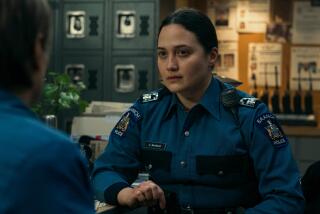MOVIE REVIEW : Overview of Underworld in Uneven ‘Deep Cover’
The L.A. drug underworld in “Deep Cover” (citywide) has a sinister looniness. The violence that strikes quickly and unexpectedly keeps everybody in a state of perpetual, hepped-up wariness. There’s no fixed code of behavior for the pushers and kingpins: A few of the honchos are so taciturn as to seem dead, others have turned the freak-out into a personal style.
Directed by Bill Duke from a script by Michael Tolkin and Henry Bean, “Deep Cover” (rated R for violence, language, drug use and sensuality) is at its best when it’s riffing on themes set down by scores of drug underworld movies. This material is such well-plowed terrain that at times it seems as if the filmmakers are pulling out all the stops just to be different.
John Q. Hull (Larry Fishburne) is a Cleveland cop selected by the Drug Enforcement Administration to infiltrate an L.A. cocaine cartel linked to a Latin American politician in disfavor with the State Department. Hull was hand-picked largely because his psychological profile matched up with his prey.
This is the old chestnut about how cops and crooks are really the same except for the uniform. It has a resonance here because it’s difficult to imagine Hull surviving without getting caught up in the tumult. When he was a boy, his father, a junkie, was shot in front of his eyes. (It’s the first scene in the film.) His career as a cop is his way of warding off his demons--his social inheritance. Hull won’t touch drugs or alcohol, but, in the course of his undercover job, he deals drugs. He can’t escape the ramifications of what he’s doing, and always the question before us is: When will he succumb to his fate?
Hull’s fate seems representative of an entire black underclass; his downfall is tragic out of all proportion to his own story. Or at least it’s supposed to be. Fishburne’s performance for most of the way is so rigid and clenched that he recalls early Clint Eastwood in his Stick With No Name period. He can be a powerful presence but his seething, blank-slate approach to the role doesn’t provide the kinds of psychological insights that the script, with its split-personality trappings, is clearly reaching for.
The rest of the acting in the film is so loopy that maybe Fishburne’s dead-weight quality was supposed to provide high contrast. The strategy doesn’t work. Instead, the film is taken over by Hull’s dealer partner David Jason, played by Jeff Goldblum with a high-style scariness that just about knocks you out of your seat.
Goldblum is such an original actor that, although from moment to moment you have no idea where his performance is going, it seems exactly right. Jason has a comfy picture-book suburban life but his real juices are reserved for the underworld. He gets high on the viciousness. He’s so amoral that he’s almost like a different species from even the most hardened criminals.
The script by Bean and Tolkin is potentially more interesting than what’s been made of it. The film gets into black and Jewish conflicts, for example, but quickly backs off. And the easy ironies that pour out about government corruption are made doubly flimsy by a coda that seems tacked-on. It’s false to the film’s pervasive spirit of rot and horror. It’s the expressiveness of that spirit, and Goldblum’s performance, that lift “Deep Cover” out of its class.
‘Deep Cover’
Larry Fishburne: John Q. Hull
Jeff Goldblum: David Jason
Victoria Dillard: Betty McCutcheon
Clarence Williams III: Ken Taft
A New Line Cinema release of a Pierre David/Henry Bean production. Director Bill Duke. Producer Pierre David, Henry Bean. Executive producer David Streit. Screenplay by Michael Tolkin and Henry Bean. Cinematographer Bojan Bazelli. Editor John Carter. Costumes Arlene Burks-Gant. Music Michael Colombier. Production design Pam Warner. Art director Daniel Bickel. Set decorator Donald Elmblad. Running time: 1 hour, 52 minutes.
MPAA-rated R (violence, language, drug use, sensuality).
More to Read
Only good movies
Get the Indie Focus newsletter, Mark Olsen's weekly guide to the world of cinema.
You may occasionally receive promotional content from the Los Angeles Times.










